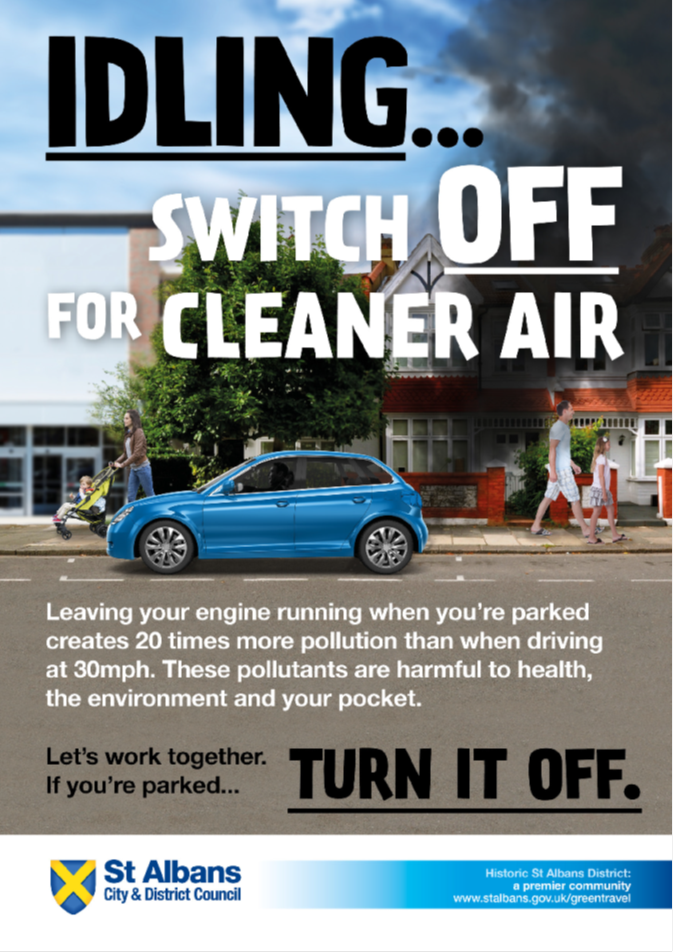Idling Action St Albans
Running your engine when you’re not driving it (idling) truly gets you nowhere. It reduces your vehicle’s fuel economy, costs you money and creates pollution which is harmful to health.
The trouble is that stationary cars release more exhaust emissions than when the car is moving at 30 mph. These pollutants have detrimental effects on human health and contribute to respiratory illness, cancer and premature deaths. Children and the elderly are especially vulnerable.

It is estimated that poor air quality leads to 40,000 premature deaths each year in the UK. Compare this to the 1,713 deaths from road traffic accidents and we can see that this is a significant problem. People can be affected by poor air quality even if they never experience any noticeable pollution related-health effects such as breathing problems because some of the effects are chronic and long-term.
St Albans City and District Council are committed to reducing unnecessary engine idling as a means to improving local air quality, preventing health impacts and reducing greenhouse gas emissions. As part of the 'idling Action St Albans' campaign we are asking drivers to switch off their engines if they are to be stationary for longer than a minute.
We are looking at ways to reduce engine idling across the District with particular focus on taxi drivers and parents collecting children at pick-up times.
We encourage people to spread the word and can provide leaflets and posters on request.
How You Can Get Involved
Lets work together for cleaner air. There are several ways you can get involved.
- Become a St Albans Idling Action Volunteer and help us spread the word to drivers and the public during our community Idling-Action days. You might also help by counting idling vehicles. As well as taking part in creating change in your community you can also gain experience of community engagement and environmental action for your CV. To find out more and apply please see the volunteer role description below
- Spread the message to your neighbours, workplace, community group or business. We can provide leaflets, posters and car stickers for fleet and/or windows.
- If you are committed to switching off when stationary, put a sticker in your car window to encourage other drivers to do the same.
- Follow us on Facebook and share our posts to spread the message. You can join us here
For information on any of the above, please contact us.
Idling Action St Albans Promotional Materials
Download the posters and leaflet below or request printed versions by emailing sustainability@stalbans.gov.uk
Herts County Council Clean Air Materials
HCC have produced a range of resources for national Clean Air Day for schools, community groups, sports clubs and businesses throughout Hertfordshire with a Toolkit and suite of resources regarding air pollution and enable all to carry out idling action events throughout the year.
- Clean Air Day Toolkit and Resources for Schools:
- Digital leaflets, social media graphics, newsletter article, activity sheets and ideas on how to improve the air quality around schools.
- The Toolkit for Schools can be downloaded from Schools Toolkit
- Clean Air Day Toolkit and Resources for Community Groups:
- Information on how to run an idling action event, digital social media graphics and leaflets to help spread the message.
- Printed postcards, leaflets and car stickers are available on request whilst stocks last.
- Idling logs can be provided to record the data collected.
- Printed materials to be requested at least 5 working days before the event at https://surveys.hertfordshire.gov.uk/s/cleanerair-materials/
- The Toolkit for Community Groups can be downloaded from: Community Groups Toolkit
- Clean Air Day Toolkit and Resources for Sports Clubs:
- Information on how to run an idling action event, digital social media graphics, newsletter article and leaflets to help spread the message.
- Printed postcards, leaflets and car stickers are available on request whilst stocks last.
- Idling logs can be provided to record the data collected.
- Printed materials to be requested at least 5 working days before the event at https://surveys.hertfordshire.gov.uk/s/cleanerair-materials/
- The Toolkit for Sports Clubs can be downloaded from: Sports Clubs Toolkit
- Clean Air Day Toolkit and Resources for Businesses:
- Digital leaflets, social media graphics, newsletter article and ideas on how to improve the air quality around the workplace.
- The Toolkit for Businesses can be downloaded from Business Toolkit
A limited number of air quality sensors and no idling banners are also available for schools and community groups to borrow to enhance idling action events throughout the year. Requests to borrow resources will be allocated on a first come first served basis and can be made by emailing cleaner.air@hertfordshire.gov.uk – the banners have proved popular and have now all been allocated for this term.
Some interesting facts
MYTH...It is better to idle the vehicle as turning the engine off and on wears it out.
TRUTH...No. Ignitions in modern cars have eliminated this problem. Idling dirties your engine with incomplete combustion increasing wear and tear. Excessive idling lets water condense in the vehicle’s exhaust system, which can lead to corrosion. It also causes spark plugs to become dirtier more quickly. This can cause an increase in fuel consumption by 4-5%.
MYTH...When it’s cold I need to keep my vehicle and passengers warm or warm up my engine.
TRUTH...It can take up to an hour for an engine to cool down. Turning off your engine, but keeping the ignition on and the fan blowing, will provide warm air for some time.
MYTH...Catalytic converters need to be hot to work properly.
TRUTH...Yes, but an idling engine does not keep a catalytic converter warm. They retain their heat for about 25 minutes after an engine is switched off.
MYTH...Starting an engine causes more pollution than idling.
TRUTH...No. Turning off an engine and restarting it after a minute or longer causes less pollution than keeping the engine idling and uses less fuel.
MYTH...It doesn't make any difference if I run my engine a few minutes longer.
TRUTH...If all drivers in central London switched off their engines, rather than idling unnecessarily, for 1 minute each day this could reduce emissions of fine particulate matter by 90kg per year!

